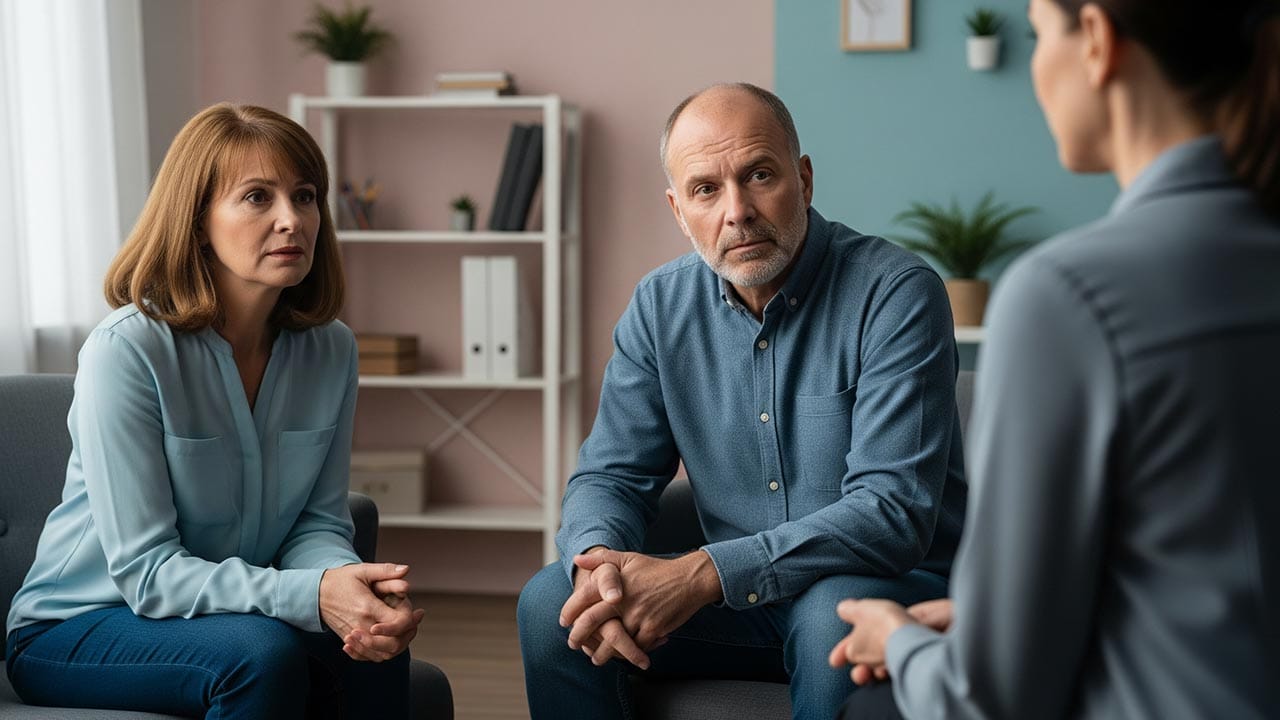
Beyond Conflict: How Couples Therapy Can Transform Your Relationship

Relationships are the very fabric of our lives, offering profound joy, companionship, and a sense of belonging. Yet, even the most loving partnerships encounter periods of strain, misunderstanding, and disconnection. The idealized image of effortless harmony often clashes with the messy reality of two unique individuals attempting to navigate life together. When communication falters, conflicts escalate, or intimacy wanes, the once comforting bond can feel like a source of profound pain. It is in these vulnerable moments that couples therapy offers a structured, compassionate, and transformative pathway back to connection and mutual understanding.
When the Foundations Quake: Recognizing the Need for Couples Counseling
Many couples hesitate to seek therapy, viewing it as a sign of failure or a last resort. This perception couldn’t be further from the truth. In reality, choosing couples counseling is an act of courage, a proactive step taken by partners who are committed to their relationship and willing to invest in its future. It acknowledges that sometimes, despite genuine love and effort, external guidance is needed to dismantle deeply ingrained patterns and build new, healthier ones.
The signals that couples therapy might be beneficial are varied, often subtle at first, gradually growing into persistent aches that erode the relationship’s vitality. These might include:
- Communication Breakdown: Conversations devolve into arguments, accusations, or silent resentment. Partners feel unheard, misunderstood, or constantly on the defensive.
- Recurring Conflicts: The same arguments resurface repeatedly, without resolution, leaving both partners exhausted and frustrated.
- Emotional Distance: A feeling of disconnection, a lack of intimacy, or a sense that partners are living parallel lives rather than shared ones.
- Erosion of Trust: Betrayal, whether through infidelity, dishonesty, or broken promises, leaves deep wounds that are difficult to heal independently.
- Life Transitions: Major life events—parenthood, career changes, illness, relocation—can place immense stress on a relationship, exposing underlying vulnerabilities.
- Sexual Dissatisfaction: Differences in desire, lack of intimacy, or unresolved issues around sex can create significant tension.
- Contemplating Separation: When one or both partners are seriously considering ending the relationship, couples therapy can provide a space to explore options, process emotions, and make informed decisions, whether that leads to reconciliation or amicable separation.
- Pre-Marital Preparation: Interestingly, couples counseling isn’t just for distress. Many engaged couples seek therapy to build strong foundations, discuss expectations, and learn effective communication skills before tying the knot, a truly proactive and beneficial approach.
Recognizing these signs isn’t about assigning blame but about acknowledging that the relationship system itself is struggling. A neutral, trained third party can illuminate these dynamics and guide partners toward more adaptive ways of interacting.
The Therapeutic Landscape: Approaches in Couples Therapy
Just as relationships are diverse, so too are the therapeutic approaches utilized in couples counseling. While the ultimate goal is consistent—to improve relational health—the pathways to achieving that goal can vary. Understanding some of the prominent models can demystify the process and highlight the richness of this specialized field.
- Emotionally Focused Therapy (EFT): Unveiling Attachment Needs
One of the most highly researched and effective models for couples therapy is Emotionally Focused Therapy (EFT), developed by Dr. Sue Johnson and Les Greenberg. EFT is rooted in attachment theory, which posits that humans have an innate need for secure connection with others. When this secure attachment is threatened or perceived to be absent, individuals often react with strong emotions and predictable “demon dialogues” or negative interactional cycles.
In EFT, the therapist helps couples:
- Identify Negative Cycles: Partners learn to recognize their destructive patterns of interaction, often triggered by underlying fears of abandonment or rejection. They see that the “enemy” isn’t each other, but the cycle itself.
- Access Underlying Emotions: The therapist guides partners to delve beneath surface-level anger or defensiveness to uncover the more vulnerable emotions (e.g., fear, loneliness, sadness) that drive their reactions.
- Reframe Interactions: As vulnerable emotions are expressed safely, partners begin to understand each other’s actions through the lens of attachment needs, leading to empathy and softening.
- Create New Cycles of Connection: The ultimate goal is to foster new, positive cycles of emotional responsiveness and accessibility, where partners can reliably turn to each other for comfort and support.
EFT is particularly powerful for couples experiencing a sense of distance, betrayal, or intense conflict, as it directly addresses the emotional core of their struggles.
- Gottman Method Couples Therapy: Building a Sound Relationship House
Developed by Drs. John and Julie Gottman, the Gottman Method is another evidence-based approach that combines research-backed insights with practical interventions. Based on decades of observing thousands of couples, the Gottmans identified specific behaviors and dynamics that predict relationship success or failure.
The Gottman Method helps couples build what they call a “Sound Relationship House,” focusing on nine components:
- Build Love Maps: Knowing your partner’s inner world, their hopes, fears, and dreams.
- Share Fondness and Admiration: Expressing appreciation and respect for one another.
- Turn Towards Bids for Connection: Responding positively to your partner’s attempts to engage.
- The Positive Perspective: Viewing your partner and the relationship in a generally positive light.
- Manage Conflict: Learning healthy ways to discuss disagreements, not avoiding them. This includes distinguishing between “solvable” and “perpetual” problems and developing strategies for both.
- Make Life Dreams Come True: Supporting each other’s individual aspirations.
- Create Shared Meaning: Developing rituals, traditions, and values that give the relationship a deeper purpose.
- Trust and Commitment: The foundational walls and roof of the house.
Gottman Method therapists teach specific skills to achieve these components, from regulated conflict resolution techniques (like the “six-second kiss” to de-escalate during arguments) to rituals of connection. It’s a highly structured approach that provides concrete tools for change.
- Cognitive Behavioral Couples Therapy (CBCT): Changing Thoughts and Behaviors
Drawing from principles of Cognitive Behavioral Therapy (CBT), CBCT focuses on how partners’ thoughts, beliefs, and behaviors influence their interactions. The premise is that relationship distress often stems from maladaptive thinking patterns (e.g., negative attributions about a partner’s intentions) and unhelpful behavioral responses.
In CBCT, the therapist helps couples to:
- Identify Distorted Thoughts: Recognize and challenge negative or irrational thoughts about their partner or the relationship (e.g., “They always do that to annoy me”).
- Modify Dysfunctional Behaviors: Learn and practice new, more constructive ways of interacting, such as active listening, clear communication, and problem-solving skills.
- Increase Positive Interactions: Actively schedule and engage in activities that foster positive emotions and connection.
- Improve Communication Skills: Focus on “I” statements, reflective listening, and expressing needs clearly.
CBCT is often practical and skill-oriented, making it appealing to couples who prefer a direct, structured approach to addressing specific behavioral and communication issues.
- Psychodynamic Couples Therapy: Exploring Historical Roots
This approach delves into the unconscious dynamics and historical patterns that partners bring into their relationship. It explores how early life experiences, family-of-origin issues, and past relationships might be unconsciously influencing current interactions and conflicts.
A psychodynamic couples therapist helps partners to:
- Understand Repetitive Patterns: Identify recurring relational dynamics that echo past experiences.
- Gain Insight into Unconscious Needs: Explore how unmet needs from childhood might be playing out in adult relationships.
- Heal Past Wounds: Work through unresolved issues that create barriers to intimacy and healthy functioning in the present.
This approach often requires a longer-term commitment but can lead to profound insights and lasting change by addressing the root causes of relational distress.
The Process of Couples Counseling: What to Expect
Regardless of the specific approach, couples counseling typically follows a general progression:
- Initial Assessment: The therapist will usually meet with both partners together, and sometimes individually, to gather information about the relationship’s history, current challenges, individual backgrounds, and goals for therapy.
- Goal Setting: Collaboratively, the therapist and couple will define clear, measurable goals for their work together. This might involve improving communication, rebuilding trust, enhancing intimacy, or learning to manage conflict more effectively.
- Intervention and Skill Building: This is the core of the therapy, where the therapist introduces new perspectives, challenges unhelpful patterns, teaches specific communication and interaction skills, and facilitates deeper emotional processing. Homework assignments between sessions are common to practice new behaviors.
- Practice and Integration: As partners begin to implement new skills and insights, the therapist helps them integrate these changes into their daily lives, addressing inevitable setbacks and celebrating progress.
- Termination or Maintenance: Once goals are met and the couple feels equipped to navigate future challenges independently, therapy may conclude, or the couple might opt for periodic “booster” sessions for maintenance.
Throughout this process, the therapist acts as a neutral facilitator, creating a safe space for open communication, fostering empathy, and gently challenging both partners to take responsibility for their contributions to the relational dynamics.
Investing in Connection: The Profound Value of Couples Therapy
Choosing to engage in couples therapy is an investment—an investment of time, emotion, and often financial resources. Yet, the returns on this investment can be immeasurable. It offers the opportunity to:
- Heal Wounds: Address past hurts, betrayals, and resentments in a structured and supportive environment.
- Rebuild Trust: For relationships impacted by infidelity or dishonesty, therapy provides a pathway to repairing trust and establishing new foundations.
- Improve Communication: Learn effective listening, clear expression of needs, and respectful conflict resolution.
- Deepen Intimacy: Reconnect emotionally, physically, and spiritually, fostering a greater sense of closeness.
- Strengthen Resilience: Develop tools to navigate future challenges as a team, emerging stronger from adversity.
- Gain Self-Awareness: Individual partners often gain profound insights into their own patterns, triggers, and attachment styles, benefiting their personal growth alongside the relationship’s health.
Ultimately, couples therapy is about empowering partners to create a more fulfilling, resilient, and loving connection. It’s about transforming conflict into understanding, distance into intimacy, and individual struggles into shared strength. It’s an affirmation that relationships, like living beings, require nurturing, attention, and sometimes, expert care to truly flourish. For any couple navigating the complexities of shared life, couples counseling offers not just a solution to problems, but a profound opportunity for growth and renewed connection.
Schedule a free 15-minute call to see if we are a good fit.

Contact Us

